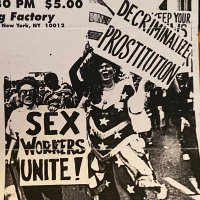
Sex Workers Archival Project
@archivalsex
a primary source share for the histories of sex workers & our struggles | focus on 1930s-late 20th century criminality | Tweets by @sm_kaylor
ID: 1349960399748288512
15-01-2021 06:03:50
1,1K Tweet
7,7K Followers
581 Following

In 2023, Ashley D. Farmer and I started a Freedom School to teach student activists how to archive their activism and control their own narrative. This fall, the freedom school is back and open to ALL! FREE and OPEN to the public but it does require registration.












![Sex Workers Archival Project (@archivalsex) on Twitter photo The racial panic isn't subtle. Sheeny states: “Prostitutes want and need the control pimps enforce over them… they are generally young women of low self-esteem… [who] have an illegitimate child who is held black and half white.” (1) The racial panic isn't subtle. Sheeny states: “Prostitutes want and need the control pimps enforce over them… they are generally young women of low self-esteem… [who] have an illegitimate child who is held black and half white.” (1)](https://pbs.twimg.com/media/GXDyXbcXsAA3JkT.jpg)


